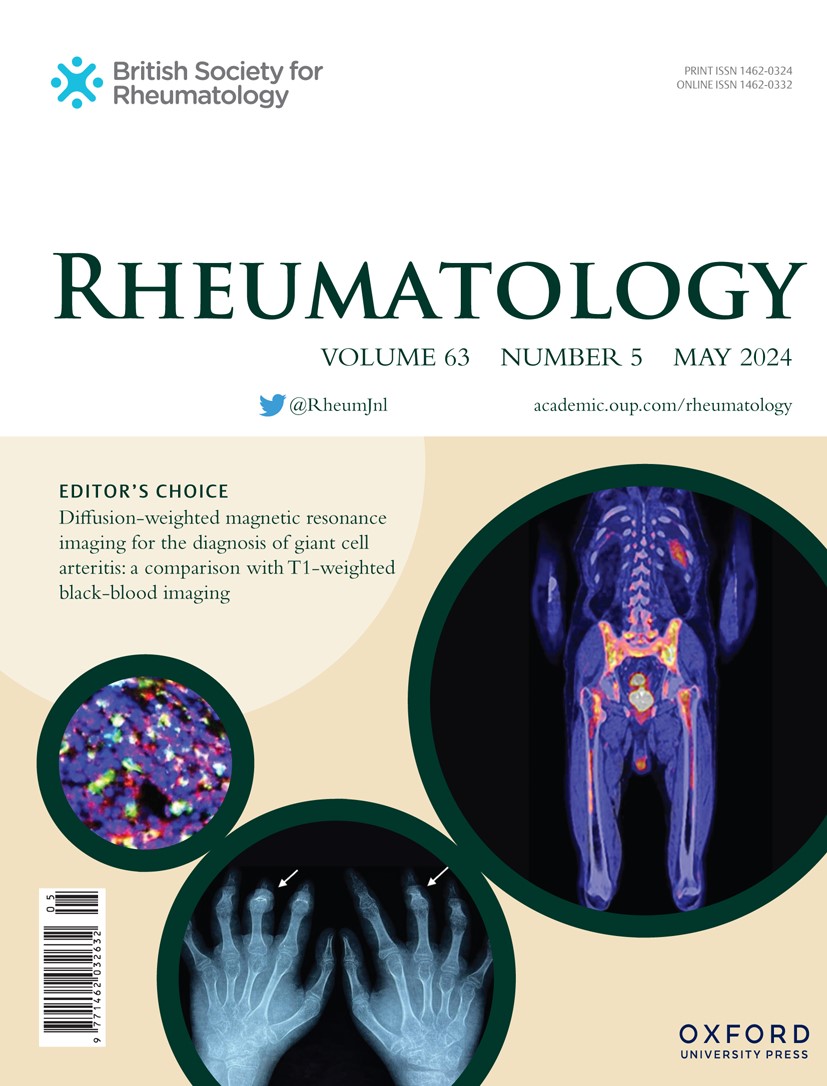JAK 抑制剂在伴有肺部疾病的全身性幼年特发性关节炎 (SJIA-LD) 中的地位:法国的经验
IF 4.7
2区 医学
Q1 RHEUMATOLOGY
引用次数: 0
摘要
目的 最近发现了一种新的伴有肺部疾病的全身性幼年特发性关节炎(SJIA)(SJIA-LD)。对于这种疾病,多种治疗方法都未能取得令人满意的效果。JAK抑制剂(JAKis)最近已被批准用于治疗JIA,但其对SJIA-LD的临床疗效证据仍很薄弱。在此,我们描述并评估了法国使用JAKis治疗SJIA-LD的实际经验。方法 这是一项基于患者病历信息的回顾性研究。研究收集了患者的全身和肺部症状、包括 CRP、铁蛋白、IL18 在内的生物数据、胸部 CT 扫描和呼吸功能测试。结果 在法国儿科风湿病中心发现了八名 SJIA-LD 患者。所有患者都接受了至少一种 JAKi(巴利替尼、鲁索利替尼和/或托法替尼)治疗。四名患者的病情得到完全控制。四名患者减少了类固醇用量,两名患者停止了类固醇用量。三位患者在停用抗IL1药物后不久,即开始使用JAKis时,出现了MAS症状。两名患者出现了其他严重的副作用(病毒再激活--EBV、BK 病毒、全血细胞减少)。在最后一次随访中,一名患者死于严重的MAS,两名患者接受了造血干细胞移植,四名患者完全应答(其中两名不再使用类固醇),一名患者对JAKis部分应答。肺部对JAKi的反应与病程没有明显联系。结论 JAKis为SJIA-LD患者提供了另一种治疗选择。然而,由于存在MAS风险,因此在使用JAKis时应谨慎停用抗IL1药物。需要在更大规模的研究中仔细监测耐受性。本文章由计算机程序翻译,如有差异,请以英文原文为准。
The place of JAK inhibitors in systemic juvenile idiopathic arthritis with lung disease (SJIA-LD): French experience
Objectives A new form of systemic juvenile idiopathic arthritis (SJIA) with associated lung disease (SJIA-LD) has recently been described. Multiple lines of treatment have failed to yield satisfactory results for this disorder. JAK inhibitors (JAKis) have recently been approved for the treatment of JIA, but clinical evidence of their efficacy in SJIA-LD is still weak. Here we describe and assess real-life experience of SJIA-LD treatment with JAKis in France. Methods This is a retrospective study based on information gathered from patients’ medical records. Systemic and pulmonary symptoms, biological data including CRP, ferritin, IL18, chest CT scan, and functional respiratory tests were collected. Results Eight patients with SJIA-LD were identified in French pediatric rheumatology centers. All received at least one JAKi (baricitinib, ruxolitinib, and/or tofacitinib). Complete disease control was obtained in four patients. Steroids were tapered in four patients and stopped in two. Three patients presented an episode of MAS shortly after anti-IL1s were stopped when JAKis were introduced. Two patients had other serious side effects (viral reactivation—EBV, BK virus, cytopenia). At last follow-up, one patient had died from severe MAS, two patients had undergone hematopoietic stem cell transplantation, four were in complete response (two of them free of steroids), and one in partial response with JAKis. Lung response to JAKi was not clearly linked to disease duration. Conclusion JAKis offer another therapeutic option for patients with SJIA-LD. However, the risk of MAS argues for caution about stopping anti-IL1s when introducing JAKis. Tolerance needs careful monitoring in larger studies.
求助全文
通过发布文献求助,成功后即可免费获取论文全文。
去求助
来源期刊

Rheumatology
医学-风湿病学
CiteScore
9.40
自引率
7.30%
发文量
1091
审稿时长
2 months
期刊介绍:
Rheumatology strives to support research and discovery by publishing the highest quality original scientific papers with a focus on basic, clinical and translational research. The journal’s subject areas cover a wide range of paediatric and adult rheumatological conditions from an international perspective. It is an official journal of the British Society for Rheumatology, published by Oxford University Press.
Rheumatology publishes original articles, reviews, editorials, guidelines, concise reports, meta-analyses, original case reports, clinical vignettes, letters and matters arising from published material. The journal takes pride in serving the global rheumatology community, with a focus on high societal impact in the form of podcasts, videos and extended social media presence, and utilizing metrics such as Altmetric. Keep up to date by following the journal on Twitter @RheumJnl.
 求助内容:
求助内容: 应助结果提醒方式:
应助结果提醒方式:


